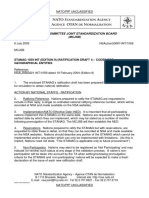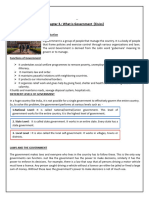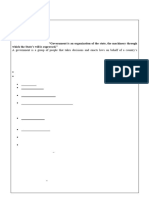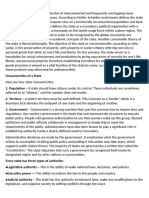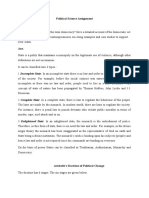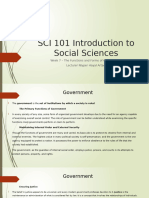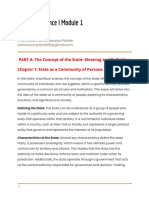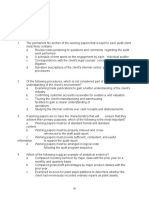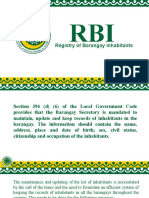CBSE Class 6 Political Science (Civics) Chapter 3 Notes - What Is Government
CBSE Class 6 Political Science (Civics) Chapter 3 Notes - What Is Government
Uploaded by
NAND KISHOR GUPTACopyright:
Available Formats
CBSE Class 6 Political Science (Civics) Chapter 3 Notes - What Is Government
CBSE Class 6 Political Science (Civics) Chapter 3 Notes - What Is Government
Uploaded by
NAND KISHOR GUPTAOriginal Title
Copyright
Available Formats
Share this document
Did you find this document useful?
Is this content inappropriate?
Copyright:
Available Formats
CBSE Class 6 Political Science (Civics) Chapter 3 Notes - What Is Government
CBSE Class 6 Political Science (Civics) Chapter 3 Notes - What Is Government
Uploaded by
NAND KISHOR GUPTACopyright:
Available Formats
Revision Notes
Class – 6 Social Science Political Science
Chapter 3 - What Is a Government?
● We always hear the term ‘government.’ But do we know what it means? Is it
a manner to rule over the people? Is it a means to bind people by rule of law?
Is it a means to protect and defend the country?
● Definition of a Government
Here is a big shocker - even big philosophers and political analysts differ in
their definition of the government.
John Locke had said once that government is a complex machinery that
protects the ‘natural rights’ - the right to life, property and to live freely - of
the people.
❖ Montesquieu on the other hand was not a believer of natural rights. He thought
that when human beings lived without a society without forming any group,
they felt unsafe and remained timid. As they formed society, they became
fearless because now they were in a big group. Once the societies and the
groups became fearless, there was a chance of war among the groups and even
among themselves within the group. This led to the formation of the
government so that human beings could then be protected and law and order
could prevail.
❖ Rousseau’s idea of government is also quite progressive. According to him,
it is true that natural rights of human beings should not be revoked by anyone.
But the machinery upon which people have entrusted the responsibility of
protecting their rights is fraud & harmful. According to him, the government
should be made up of all the people living in the nation-state.
❖ So, what then can be the definition of a government in a modern world? It is
a mixture of all above philosophies. A government is there to perform its basic
duties necessary to make the nation keep moving forward. It functions as the
gatekeeper of the rights of the people. However, in modern world, it is not
Class VI Social Science www.vedantu.com 1
practically possible for all the people to take part in the governance directly.
So what they do is, they elect people to power who, on their behalf, would
then later form the government.
● The Jobs of the Government
Generally speaking, the primary job of a government is to run the country.
Now there are various aspects to running a country.
❖ The government also looks after the development of the country. It decides
where to build roads, hospitals or a school. It makes sure that the facilities like
electricity, water etc reach the maximum number of people in the country.
❖ The government takes care of the economy of the country. It controls the
inflation (excessive price rise) and it makes sure that the factories,
manufacturing units & industries remain healthy so that the country advances
financially. It is also responsible for controlling the banking system of the
country.
❖ The government, with the help of armed forces, makes sure that the borders
of the nation are protected from any foreign attacks. It also maintains amicable
relationships with its neighbouring countries through diplomacy and other
policies.
❖ The government in a welfare state then makes sure that the people of the
country have food to eat. It makes special arrangements for poor people. In
times of disasters, the government helps the people with necessary aids.
❖ The government also has the judicial arm - the court to resolve quarrels
between the citizens of the country.
● Levels of the Government
❖ A country is a huge area. Millions of people live in a country. It is not possible
for a centralised government to govern, protect and develop all the parts of
the huge country. To solve this problem, leaders have come up with different
levels of the government.
Class VI Social Science www.vedantu.com 2
❖ We have various state governments to look after affairs of the states, to protect
and defend the people living in the states. Then there are focused local
governments which emphasises on developing a particular area of the state &
helping the people of that are. The duty of central government is to develop,
govern, and protect the whole country in a general manner.
❖ This kind of decentralised form of government is known the federal
government. In India, we also see such a type of government.
● India has states like Haryana, Kerala, Maharashtra etc. These states also have
their respective state governments. These states also consist of municipalities
and Panchayats - these are the local form of governments.
● How Does Government Make Sure That Its Rules Are Followed?
So, government generally formulates rules to manage the economy, build
roads, stop people from encroaching on the properties of others. But why do
people listen to governments?
People listen to governments because the government’s legislative arm creates
laws so that there remains an order and peace in society. For example, as your
book says, every person who wants to drive a motor vehicle has to first obtain
driver’s licence. Without driver’s licence, it is illegal to drive a vehicle and it
is punishable. This rule is also enforced with the help of laws concerning
motor vehicles.
There are certain laws that prevent others from entering the property of others
without permission. The citizens, themselves can use such laws to protect
themselves.
● Types of Governments
❖ There are many types of governments. The most popular type of government
that we see around us is the democratic government. In a democratic
government, people elect the leaders who would govern the nation on their
behalf. The merit of democratic government is that the people have a say in
the way the government functions.
Class VI Social Science www.vedantu.com 3
❖ In the olden days, there was monarchy where the King had the sovereign
power. People would also not elect the King. Generally, the rule was dynastic
in nature. Most of time, King had little regard for the desires and expectations
of the people.
❖ Again, in many countries, we see dictatorial governments where one man or
one government has every power. That man or that government stifles
freedom of the people & does everything to make sure that the power remains
with the man or the government.
● India Is a Democracy
India is also a democracy. The people of India take part in the election where
they choose people who would then represent them in the assembly. This kind
of democracy is known as representative democracy because here, instead of
directly participating in the governance, the people choose their
representatives who would do that work.
But India was not democracy from beginning. Before the British came, India
was ruled by Kings and dynasties. When the British came, India became the
subject of British rule. It is the sacrifice of the freedom fighters that has helped
India gain democracy. In India any adult - be it, man or woman - has the right
to vote. This is known as the Universal Adult Franchise - a major criterion for
any country to call itself democratic
Class VI Social Science www.vedantu.com 4
You might also like
- OneTouch Government TextbookDocument503 pagesOneTouch Government Textbookchampionnana355100% (9)
- Military Committee Joint Standardization Board (MCJSB)Document215 pagesMilitary Committee Joint Standardization Board (MCJSB)Samo PecanNo ratings yet
- GED 107 EthicsDocument123 pagesGED 107 EthicsKevin Ramiro100% (2)
- Ch3 Hand Out What is GovtDocument4 pagesCh3 Hand Out What is GovtRubai SensarmaNo ratings yet
- CH 3 Government NotesDocument3 pagesCH 3 Government NotesSatyadev PrasadNo ratings yet
- What Is Government: Class 6 NCERT Polity Chapter 3Document12 pagesWhat Is Government: Class 6 NCERT Polity Chapter 3STUDY AT EASENo ratings yet
- UCSP Module 7 SummaryDocument11 pagesUCSP Module 7 SummaryJudy May BaroaNo ratings yet
- Class 6 Civics CH 3 Notes - 230816 - 175403Document4 pagesClass 6 Civics CH 3 Notes - 230816 - 175403Anya SinghNo ratings yet
- SocialDocument12 pagesSocialchiragm1408No ratings yet
- Promotion of Life Skills: Problem Is Something That Is Difficult To Deal With or To UnderstandDocument55 pagesPromotion of Life Skills: Problem Is Something That Is Difficult To Deal With or To UnderstandPAMAJANo ratings yet
- Concept of GovernmentDocument4 pagesConcept of GovernmentLiezl GabitoNo ratings yet
- UCSP Module 7Document7 pagesUCSP Module 7jonalyn obinaNo ratings yet
- What Is Good Government (Essay)Document3 pagesWhat Is Good Government (Essay)Faith Ong75% (4)
- Civics 2Document42 pagesCivics 2abdulsamadm1982No ratings yet
- Unit 2Document5 pagesUnit 2bhumikabisht3175No ratings yet
- Module-9Document6 pagesModule-9Chrisna シNo ratings yet
- The State: Sajadul Islam Akash 1831722642Document18 pagesThe State: Sajadul Islam Akash 1831722642Obaidur Rahaman Naim 2021082649No ratings yet
- Pol Sci AssignmentDocument17 pagesPol Sci Assignment8cbxmpgntnNo ratings yet
- Q2-W1-UCSPDocument10 pagesQ2-W1-UCSPRetis, Thirdy SamanthaNo ratings yet
- Elements of Govt-2Document42 pagesElements of Govt-2agabisimeon1No ratings yet
- STATEDocument5 pagesSTATEAnima MundaNo ratings yet
- Government Exam 1Document9 pagesGovernment Exam 1dawosika2010No ratings yet
- Ncert Notes For Polity: 8th StandardDocument34 pagesNcert Notes For Polity: 8th Standardnavam singhNo ratings yet
- Political Science AssignmentDocument7 pagesPolitical Science AssignmentPriyanshu TawerNo ratings yet
- StateDocument74 pagesStatejericNo ratings yet
- State and Non State Inst.Document14 pagesState and Non State Inst.Devilz Gaming100% (1)
- SCI 101 Week 7 The Functions Forms of GovernmentDocument15 pagesSCI 101 Week 7 The Functions Forms of Governmentzerouali.islam99No ratings yet
- Nomita's Session 5 Forms of GovernmentDocument35 pagesNomita's Session 5 Forms of GovernmentSakib Reza LunikNo ratings yet
- Disccus The Role or Responsibilities of Government in Our SocietyDocument4 pagesDisccus The Role or Responsibilities of Government in Our SocietySMART ROBITONo ratings yet
- Democracy - 10th Class Civics NotesDocument4 pagesDemocracy - 10th Class Civics NotesNikhil DhawanNo ratings yet
- UNCP M7-M12 (2ND QUARTER)Document35 pagesUNCP M7-M12 (2ND QUARTER)chelseaychuuNo ratings yet
- G 6 GovernmentDocument2 pagesG 6 GovernmentAmarnath MalliahyagariNo ratings yet
- Role of A StateDocument7 pagesRole of A StateShriruNo ratings yet
- Forms of GovernmentDocument17 pagesForms of GovernmentJames Bryan Pepico100% (1)
- Jamb GovernmentDocument7 pagesJamb Governmentomosanni skillsNo ratings yet
- SST GRADE 6-Government ResourcesDocument5 pagesSST GRADE 6-Government ResourcesManan GandhiNo ratings yet
- .Document6 pages.Anup KumarNo ratings yet
- Types of Government 3Document7 pagesTypes of Government 3bmoneybookings100No ratings yet
- DELOS REYES, Steve - PolGov - Module 3Document6 pagesDELOS REYES, Steve - PolGov - Module 3Fanboy KimNo ratings yet
- SSCI 101 LectureDocument76 pagesSSCI 101 LectureShein GomezNo ratings yet
- ALS Lesson 7 and 8Document8 pagesALS Lesson 7 and 8Shaine Carbonel SindanumNo ratings yet
- Social Studies - Civics - Elements of A DemocracyDocument12 pagesSocial Studies - Civics - Elements of A DemocracyVeena KumariNo ratings yet
- © Ncert Not To Be Republished: What Is Government?Document8 pages© Ncert Not To Be Republished: What Is Government?Arun KunnanchiraNo ratings yet
- Kirti Pol SciDocument16 pagesKirti Pol Sci8cbxmpgntnNo ratings yet
- Statecraft and Why States Are ImportantDocument4 pagesStatecraft and Why States Are ImportantAmeena BibiNo ratings yet
- DELOS REYES, Steve - PolGov - Self-AssessmentDocument5 pagesDELOS REYES, Steve - PolGov - Self-AssessmentFanboy KimNo ratings yet
- Forms+of+Government +OrganizerDocument10 pagesForms+of+Government +OrganizervoltairebervinsNo ratings yet
- State Non StateDocument16 pagesState Non Stateaceleadecarlos4No ratings yet
- FY Political Sci I - Module 1Document24 pagesFY Political Sci I - Module 1Varali ShirkeNo ratings yet
- Ucsp 2Document8 pagesUcsp 2cesiareenaNo ratings yet
- GovernmentDocument7 pagesGovernmentNaszmieNo ratings yet
- Liberty and EqualityDocument6 pagesLiberty and Equalityansarrasheedkhan920No ratings yet
- 02 - 01 Final (1) PolityDocument8 pages02 - 01 Final (1) PolityGamidi Suneetha NaiduNo ratings yet
- sb6Document4 pagessb6Michael Mimi BesraNo ratings yet
- Zaid Pol Sci 2Document5 pagesZaid Pol Sci 2Zee MackNo ratings yet
- Changing Dimensions of Development Strengthening Democracy Through GoodDocument11 pagesChanging Dimensions of Development Strengthening Democracy Through GoodSamirNo ratings yet
- UCSP Lesson 7 ReviewerDocument5 pagesUCSP Lesson 7 ReviewerAlexa Francine MoralesNo ratings yet
- Citizenship Education 2Document9 pagesCitizenship Education 2fcbolarinNo ratings yet
- Personal Life: Krishna Chandra, ShriDocument9 pagesPersonal Life: Krishna Chandra, ShriSai Malavika TuluguNo ratings yet
- Debate: Direct Democracy: From DebatepediaDocument47 pagesDebate: Direct Democracy: From Debatepediajagetia_tanmayNo ratings yet
- PPG Q2 W1&2Document4 pagesPPG Q2 W1&2ARIEL ANGELIONo ratings yet
- MathematicianDocument44 pagesMathematicianNAND KISHOR GUPTANo ratings yet
- Question PaperDocument8 pagesQuestion PaperNAND KISHOR GUPTANo ratings yet
- Question PaperDocument8 pagesQuestion PaperNAND KISHOR GUPTANo ratings yet
- Question PaperDocument8 pagesQuestion PaperNAND KISHOR GUPTANo ratings yet
- Question PaperDocument8 pagesQuestion PaperNAND KISHOR GUPTANo ratings yet
- Draft Proposal 229013441Document19 pagesDraft Proposal 229013441NAND KISHOR GUPTANo ratings yet
- Acknowledgementslip S1346721847000Document1 pageAcknowledgementslip S1346721847000NAND KISHOR GUPTANo ratings yet
- 6th RTSE RESULT L-2Document6 pages6th RTSE RESULT L-2NAND KISHOR GUPTANo ratings yet
- Running Head: Intergroup Conflict 1Document4 pagesRunning Head: Intergroup Conflict 1Geoffrey MwetiNo ratings yet
- Trip Logistics CaseDocument20 pagesTrip Logistics CaseLingamurthy BNo ratings yet
- Education and Cultural ValuesDocument85 pagesEducation and Cultural ValuesRonadel Mecayer Magcalas CarpenterNo ratings yet
- Camion Porte VoituresDocument51 pagesCamion Porte VoituresZosmo Simiao CostaNo ratings yet
- Equality and Issues Faced by The LGBTQ - CommunityDocument3 pagesEquality and Issues Faced by The LGBTQ - Communityarefa SheikhNo ratings yet
- Sample Answer Equivocation FallacyDocument2 pagesSample Answer Equivocation FallacypratimaghevariyaNo ratings yet
- 5 Edictal CitationDocument2 pages5 Edictal CitationRethabile MakoanyanaNo ratings yet
- The Contiguous Zone: Bernaerts' Guide To The 1982 United Nations Convention On The Law of The SeaDocument2 pagesThe Contiguous Zone: Bernaerts' Guide To The 1982 United Nations Convention On The Law of The SeaGayatri Prasad BirabaraNo ratings yet
- Collaborative Module For Outcomes-Based and Flexible LearningDocument14 pagesCollaborative Module For Outcomes-Based and Flexible LearningRoy Ivan V. Delos ReyesNo ratings yet
- Gold Refinery Overview For ShipmentsDocument3 pagesGold Refinery Overview For ShipmentsasavianoNo ratings yet
- Please Add Rs. 500/-Cost of Application Form With Your Admission FeeDocument5 pagesPlease Add Rs. 500/-Cost of Application Form With Your Admission FeevishalsidankarNo ratings yet
- Reliance General Insurance Company Limited: "A" Policy For Act Liability Insurance (Private Car) - Policy ScheduleDocument6 pagesReliance General Insurance Company Limited: "A" Policy For Act Liability Insurance (Private Car) - Policy ScheduleRavi KantNo ratings yet
- UBER TraduccionDocument3 pagesUBER TraduccionFreddy EspinalNo ratings yet
- Project IBF Submitted To: DR. Sabeen Khurram KhanDocument7 pagesProject IBF Submitted To: DR. Sabeen Khurram KhanSheikh AbdullahNo ratings yet
- Audit Evidence Quiz 1: Multiple ChoiceDocument7 pagesAudit Evidence Quiz 1: Multiple ChoiceweqweqwNo ratings yet
- Globalization and International InvestmentDocument38 pagesGlobalization and International InvestmentDương Nguyễn Nhật QuỳnhNo ratings yet
- Group 7 ResearchDocument25 pagesGroup 7 ResearchJessie Mae LeysaNo ratings yet
- Registry of Barangay InhabitantsDocument12 pagesRegistry of Barangay InhabitantsDenAymNo ratings yet
- Hall v. SwiftDocument12 pagesHall v. SwiftBillboardNo ratings yet
- CHP 9: Managerial Accounting Edisi 11 by Hilton & PlattDocument50 pagesCHP 9: Managerial Accounting Edisi 11 by Hilton & Plattayu umyana100% (1)
- Caste & Class in Rural IndiaDocument10 pagesCaste & Class in Rural IndiaArchana ChordiyaNo ratings yet
- Reforms in Public Administration: Issues/Challenges and ProspectsDocument36 pagesReforms in Public Administration: Issues/Challenges and ProspectsSanjeevNo ratings yet
- De Roxas - Truth Shall Set You FreeDocument17 pagesDe Roxas - Truth Shall Set You FreeMelvin PernezNo ratings yet
- Midterm Crim103Document36 pagesMidterm Crim103Julidee Angel DacilloNo ratings yet
- Enver Buqaj Revista DiritoDocument10 pagesEnver Buqaj Revista DiritoDurim LlugiqiNo ratings yet
- Post-Mortem Analysis On The Analysis and Evaluatio ModifyDocument9 pagesPost-Mortem Analysis On The Analysis and Evaluatio ModifyMatthieu PotesNo ratings yet
- Architects To PostConflict ReconstructionDocument45 pagesArchitects To PostConflict ReconstructionMoh BarzNo ratings yet
- Even Though Parliament Has Not Enacted An Enabling Law To Give Effect To Article..Document8 pagesEven Though Parliament Has Not Enacted An Enabling Law To Give Effect To Article..LDC Online ResourcesNo ratings yet

